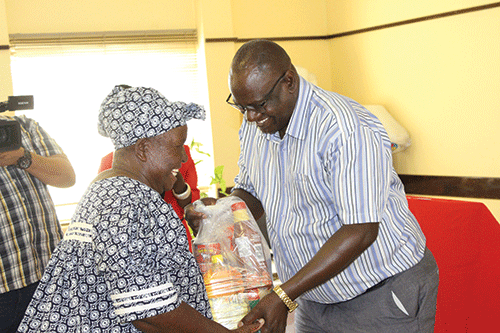Global food prices are set to increase drastically for the rest of 2022, and Namibia will not be spared from the phenomenon. This is because global Covid-19 recovery efforts have been significantly set back by the Russian conflict with Ukraine, which in turn has further exacerbated supply chain delays and severe oil price spikes. In fact, Namibia’s largest grain-processing company Namib Mills already confirmed an increase during April on wheat flour, pasta, bread, rice, maize meal, instant porridge and sugar.
During the past five years, Namibia imported most of its wheat requirements from Russia. And between them, Ukraine and Russia produce roughly 20% to 30% of all corn, maize and wheat consumed around the world. Now, the ongoing war between Russia and Ukraine has amplified already high food and energy costs.
Commenting yesterday on the increase in food prices, Namib Mills said Namibia has not been spared in the economic shock endured during the Covid-19 pandemic, which has been further compounded by the Russian–Ukrainian crisis. This, according to Namib Mills, has ramifications on the global food supply chains since the two nations account for nearly a quarter of the world’s wheat production.
“The ripple-effect from this may be in the form of a global decrease in the supply of wheat, prompting high demands and possible supply constraints, which could subsequently lead to upward price adjustments. Although countries in the first and second world have declared sanctions against Russia as a means to mitigate the crisis and ensure the basic right to human life, third world countries are already feeling the supply disruptions,” read the statement from Namib Mills’ spokesperson Selma Moongo.
Namib Mills noted that food prices have already been on the rise for the last year, well before Russian forces crossed into Ukraine. Major factors for the global price increases also include a higher demand from China, high transportation costs, supply chain disruptions and rising commodity prices. The prices of global wheat has already increased 93% during the last 12 months.
Moongo continued that Africa is still over-dependent on the rest of the world, seeing that the continent is not yet self-sufficient in terms of food production and does not manufacture what it needs to be self-sustainable.
In preparation of expected global grain shortages, the company yesterday confirmed that it has secured sufficient supply of wheat for the 2022 calendar year. These supplies will originate from Namibian and South African farmers for the first two quarters of 2022, and other black sea countries such as Poland and Lithuania for the third quarter. For the fourth quarter, Namib Mills will once depend on local supply as Namibian farmers start harvesting.
“The global demand for wheat is increasing due to the unique viscoelastic and adhesive properties of gluten proteins, which facilitate the production of processed foods, whose consumption is increasing as a result of the worldwide industrialisation process and the westernisation of the diet.
Gluten is the glue that allows for optimal binding in bread and pastas. If the Russia-Ukraine crisis persists longer, Africa will suffer in the medium-term since wheat originates from that area and needs cold weather to achieve optimal protein levels. While Namibia is devising swift measures to increase wheat production, our weather patterns restrict optimal wheat farming to limited areas such as the Hardap and Omaheke regions, respectively,” Moongo explained.
She added that the crisis is a global reality, and the only way to remain afloat is to adapt and adjust as the need arises.
Said Moongo: “Namib Mills asserts itself by reassuring its consumers that it will continue to manufacture and distribute basic food and ensure availability, accessibility and the utilisation of these foods while at the same time combating malnutrition. Feeding the nation remains the core of why Namib Mills has been able to stand firmly and preserve a 40-year legacy founded on people, community & environment, processes and quality products and services”.
She added that consumers will be notified should any external directives occur which would compel Namib Mills to modify its services.
Meanwhile, industry experts believe the most significant impacts of the crises will be felt in Africa, where the continent still imports 30% of wheat from Ukraine and Russia.
The FAO Food Price Index (FFPI), a measure of the monthly change in international prices of a basket of food commodities, averaged 140.7 points in February 2022, up 5.3 points (3.9%) from January, and as much as 24.1 points (20.7%) above its level a year ago. This represents a new all-time high, exceeding the previous top of February 2011 by 3.1 points.
This year’s February rise was led by large increases in vegetable oil and dairy price sub-indices. Cereals and meat prices were also up, while the sugar price sub-index fell for the third consecutive month.
Even sunflower oil has been affected as the Russian war in Ukraine already influenced prices in February, considering both countries are major producers. Unrelated to the situation in Ukraine, worldwide dairy prices increased due to heightened demand from Asia and the Middle East.
Moreover, United Nations World Food Programme (WFP) executive director David Beasley has warned of looming food scarcity with disastrous humanitarian consequences emanating from the conflict in Ukraine.
During a recent media briefing, he pointed out that Ukraine used to produce enough food for four billion people around the world.
“If we don’t end this war and get (Ukraine’s) economy going again so that they’re planting and harvesting, we’re going to have a global supply problem later this year,” Beasley cautioned, noting: “If we don’t act now, strategically and quickly, it could be hell on earth”.
During a recent interview with New Era, Russian Ambassador to Namibia Valeriy Utkin denied any Russian involvement in the price spike and volatility in the international oil market.



